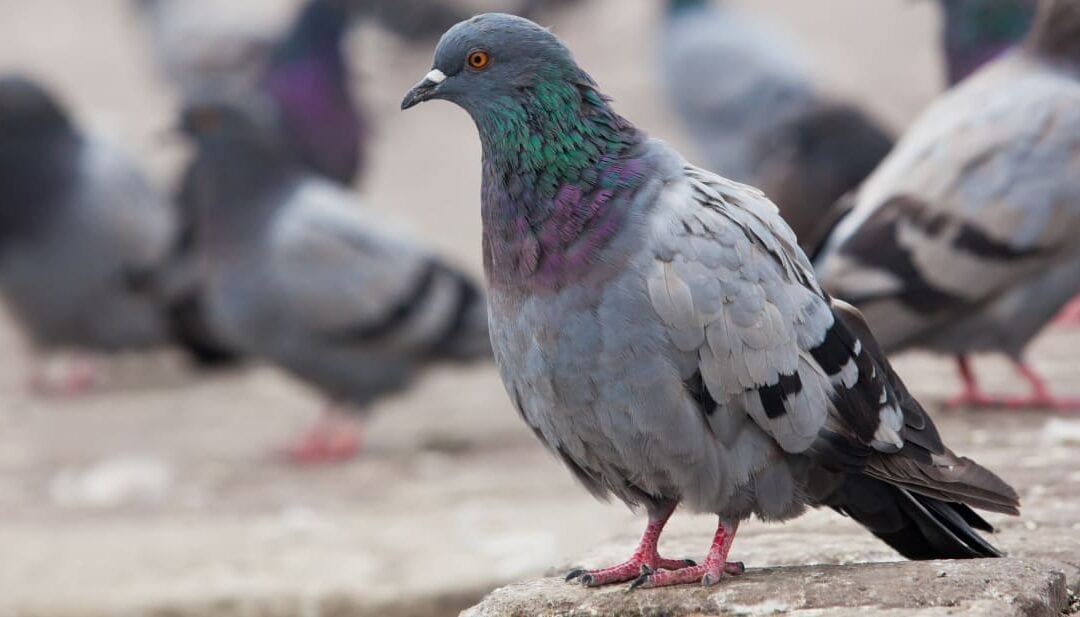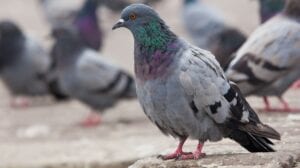Kristyn Wong-Tam doesn’t hate pigeons.
But the councillor for Toronto Centre (Ward 13) has watched constituents fight pigeons for long enough, having fielded numerous complaints over the years from people and businesses forced to buy netting to keep the birds off balconies and window ledges and anything else that can act as a perch or nesting area.
“I do think we’ve reached a tipping point in Toronto,” says the councillor, who has often spotted people feeding pigeons random food in places where people and birds congregate, like Yonge-Dundas Square.
“I’ve seen people take out a loaf of bread and throw it on Bay Street.”
Wong-Tam believes that people are acting out of genuine concern for the birds, or to ensure food doesn’t go to waste. In fact, the discarded food also attracts vermin.
When Toronto council meets this week, Wong-Tam intends to introduce a member’s motion asking that the city examine the possibility of banning feeding pigeons anywhere in the city, in public and private spaces, in order to control the pigeon population.
Currently, the city of Toronto parks bylaw prohibits feeding wildlife or depositing food for wildlife in parks, but there is no such restriction elsewhere. As a result, pigeons crowd public spaces like sidewalks, plazas, boulevards and laneways where they can find discarded food and are also fed by people.
In fact, the lack of enforcement of the bylaw in parks has even rendered some green space unusable, according to Wong-Tam’s motion.
Only two tickets for feeding wildlife in parks were issued in 2020, according to the city.
The lack of control means business is booming for David Szabo, owner of Pigeon Tom, a firm specializing in bird control. Cleaning up after pigeons, and protecting balconies and buildings from pigeons is most of his business.
Nesting pigeons love concrete balconies, and they can quickly coat patio furniture, barbecues and stored bicycles in droppings that are difficult and sometimes impossible to clean effectively.
“It literally drives people crazy because they’re so loud,” says Szabo. “They’re always cooing, especially early in the morning at 6 or 7 a.m.”
Because the birds return to nest in the place where they were born, the situation can quickly spiral out of control, Szabo says. Then there are the people who never go out on their balconies at all.
“In some cases, the person just never went out on the balcony for like five or six years, and it’s so bad you can’t open the door.”
Pigeon experts agree that feeding pigeons people-food, or large quantities of birdseed, isn’t good for the birds or the people who have to live with them. It leads to overpopulation and a buildup of unsightly and corrosive droppings, among other problems.
“People think that they’re feeding the birds, oftentimes they’re feeding the rats,” says pigeon expert Elizabeth Carlen, a post-doctoral research fellow at the Living Earth Collaborative at Washington University in St. Louis.
Carlen has studied pigeon populations from Boston to Washington, D.C.
“I have seen many places where people have dropped birdseed, thinking they are feeding the birds, and right behind it will be a rat burrow.”
Cities, with their proliferation of concrete balconies and windowsills and ledges, are just like the rock cliffs pigeons populate in nature, says Andrew Blechman, author of “Pigeons: The Fascinating Saga of the World’s Most Revered and Reviled Bird.”
“They like our cities because pigeons don’t do trees, they do cliffs. It’s a concrete jungle and that’s how they like it.”
Pigeons and people have enjoyed a symbiotic relationship since at least Mesopotamia, says Blechman. Pigeons have been a source of food, kept as pets, flown for sport and trained to assist in warfare — including a Canadian pigeon named Beachcomber, who won a medal for flying across the foggy English Channel to Britain to deliver news of the landing at Dieppe.
Colin Jerolmack, author of “The Global Pigeon,” has observed people feeding pigeons in parks for hours at a time.
“Many socially marginalized people — people who are homeless or elderly — fed the pigeons and out of it developed pet-like relationships that were very meaningful to them,” says Jerolmack.
“It may sound crazy, but pigeons do have different personalities and they would recognize the feeders and sit on their shoulders and wrists and show them affection.”
Also kids love pigeons and it is often their first close encounter with wildlife if they live in the city, Jerolmack says.
Jerolmack, Carlen and Blechman agree the solution is not to ban feeding pigeons, mostly because a ban is unlikely to work.
Blechman says that the people most likely to be feeding pigeons the most know it’s wrong, but they can’t help themselves. They’re obsessed. They’re up at 4 a.m., dumping an entire bag of birdfeed for the pigeons. They’re hard to catch.
“If you’re going to feed a pigeon, feed responsibly — a teaspoon or a tablespoon of bird-feed, that’s it,” says Blechman, who favours public education campaigns.
Keeping a pigeon as a pet is allowed in Toronto, as long as it is kept exclusively on private property, but Wong-Tam says people feeding wild pigeons from their homes can also create a problem for the neighbourhood if it draws flocks of birds.
The city receives about 60 complaints a year related to pigeons, including pet pigeons, wild pigeons and pigeon droppings, under various bylaws, according to data supplied by the city.
Other forms of population control are more likely to work better than a poorly enforced ban, say experts.
Blechman says some cities control their pigeon populations by building coops on top of buildings, feeding the birds where they roost. The eggs laid there are not allowed to hatch.
He finds it hard not to respect pigeons. They are gentle, monogamous and they raise their offspring together. They like humans. They can fly 900 kilometres at a stretch, at an average speed of 95 km/h, from a place they’ve never been to their home, like laser missiles.
“Pigeons have been beloved all through human history. It’s only the last 60 years that people have been nagging on them,” Blechman says.
“Cities can be awfully concrete, it’s awfully nice to see something that we’re not in control of, that’s a piece of nature, like a squirrel, like a bird, like a pigeon,” Blechman adds. “They animate our lives and that’s why people like to sit on a bench and feed them a piece of crust.”
Pigeon Patrol Products & Services is the leading manufacturer and distributor or bird deterrent (control) products in Canada. Pigeon Patrol products have solved pest bird problems in industrial, commercial, and residential settings since 2000, by using safe and humane bird
deterrents with only bird and animal friendly solutions. At Pigeon Patrol, we manufacture and offer a variety of bird deterrents, ranging from Ultra-flex Bird Spikes with UV protection, Bird Netting, 4-S Bird Gel and the best Ultrasonic and audible sound devices on the market today.
Voted Best Canadian wholesaler for Bird Deterrent products ten years in a row.
Contact us at 1 877-4-NO-BIRD,(604) 585-9279 or visit our website at www.pigeonpatrol.ca
Pigeon/Pigeon Patrol / Pigeons Roosing / Vancouver Pigeon Control / Bird Spikes / Bird Control / Bird Deterrent / PIgeon Deterrent / Surrey Pigeon Control / Pest / Seagull deterrent / Vancouver Pigeon Blog / Birds Inside Home / Pigeons in the cities / Ice Pigeons / What to do about pigeons / sparrows, Damage by Sparrows, How to Keep Raccoons Away, Why Are Raccoons Considered Pests / De-fence / Pigeon Nesting / Bird Droppings / Pigeon Dropping / woodpecker control / Professional Bird Control Company / Keep The Birds Away / Birds/rats/seagull/pigeon/woodpecker/dove/sparrow/pidgeon control/pidgeon problem/pidgeon control/flying rats/pigeon problems/ bird netting/bird gel/bird spray/bird nails/bird guard


